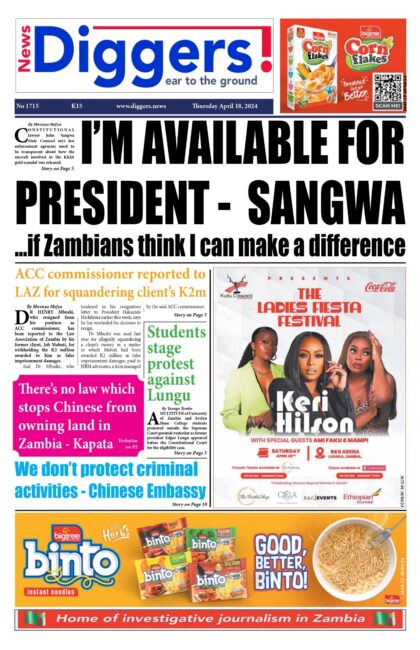Lusaka lawyer Dickson Jere says government’s appeal in the South African court is crucial because the arbitration can go on regardless of whether or not the Zambian courts agree as long as it is registered.
Jere, who is a former presidential press aide in the MMD administration under Rupiah Banda, explained that unless the Ruling was stayed, nothing stopped the arbitration from proceeding in South Africa if the parties chose Johannesburg as Seat of Arbitration.
“The statement by the Attorney General that he intends to appeal against the Ruling is crucial. Unless that Ruling is stayed, nothing stops the arbitration proceedings in South Africa if the parties chose Johannesburg as Seat of Arbitration. And once the Award (Judgment) is passed, it can be enforced anywhere in the world so long as it is registered. Mind you Zambia is signatory to the New York Arbitration Convention, which is for the Recognition and Enforcement of Foreign Awards,” Jere stated in a Facebook post, Tuesday.
He noted that the question that was before both courts was the same but the difference was that the South African court had already answered in the affirmative and referred the KCM dispute to arbitration.
“The question that was before the South Africa Court is the same question that has been raised in Zambia High Court. The question is – should the current dispute be referred to arbitration? The Court in Zambia is yet to make its determination on that question. So in short, the South Africa High Court has answered the question in affirmative. It has merely referred the KCM dispute to arbitration because, as the Judge said, the parties have an arbitration clause. And that the parties agreed to subject themselves to an Arbitral Tribunal in Johannesburg,” stated Jere.
“That being the case, that Ruling does not necessarily have to be registered in Zambia. The other party can proceed to arbitration in Johannesburg and try and get an Award there. Sometimes Arbitration can proceed without the other party taking part unless they challenge the jurisdiction of the Arbitral Tribunal. This reminds me of a course, Conflict of Laws, which I took at UNZA under the tutelage of Prof Patrick Mvunga, SC. Which decision do you follow when there is conflict of Laws in two or more jurisdictions? Which law is applicable? Interesting jurisprudence. If I have to speak as scholar and lecturer as well as student of international law of arbitration, the dispute raises fundamental questions of law, which jurists worldwide have been grappling with for a long time now.”












